Supporting others in Building Psychosocial Skills to Prevent Gambling Harm.
As a professional, you play an essential role in helping young people develop the skills they need to manage stress, regulate their emotions, build resilience, and resist negative influences such as gambling. The following approaches can help guide you in supporting young people to navigate challenges and make healthy choices.
a) Stress and Coping with It
Stress is one of the most common reasons young people turn to unhealthy behaviors, including gambling. When children and teenagers face pressures—whether from school, social situations, or family issues—they may look for ways to escape or cope. Gambling, with its potential for instant rewards and distractions, can seem like an easy outlet.
Key Strategies to Help Young People Cope with Stress:
- Identify Stressors: It could be academic pressures, friendships, or family issues what causes stress. Journaling or simple conversations can help them express their feelings and recognize the sources of stress.
- Teach Mindfulness and Relaxation: Introduce relaxation techniques like deep breathing or guided meditation. For example, practicing the ”4-7-8” breathing method—inhale for 4 seconds, hold for 7 seconds, exhale for 8 seconds—can help calm the nervous system during stressful moments.
- Encourage Physical Activity: Regular exercise is a great way to manage stress. Activities like walking, running, or playing sports can improve mood by releasing endorphins. You could help by organizing outdoor activities or supporting them in joining a team.
- Promote Social Support: Encourage young people to talk to trusted adults, friends, or counselors when they’re feeling stressed. Peer support groups can also provide a space to share experiences and offer mutual understanding.
Example for You:
You could create a ”Stress-Free Friday” activity where everyone engages in a stress-relieving activity together—like a walk, yoga, or a calming hobby—teaching youngsters healthy ways to cope with stress.
How to Manage Stress:
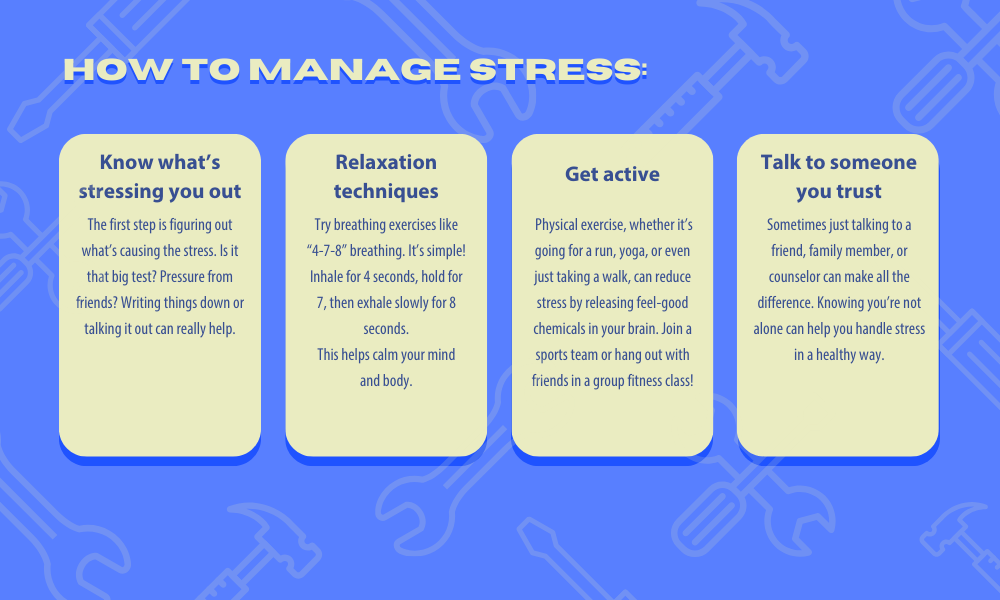
b) Understanding and Managing Emotions
Young people often turn to gambling to escape uncomfortable emotions, such as loneliness, boredom, or anxiety. Teaching emotional intelligence—how to recognize, understand, and manage their emotions—can provide them with healthier ways to cope.
Managing Emotions:
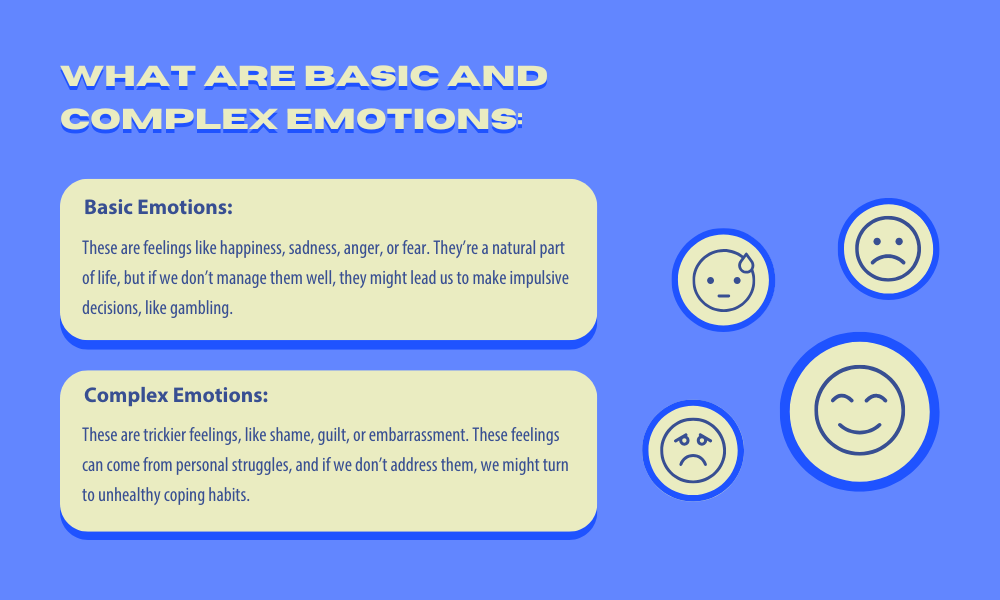
- Recognize Basic Emotions: Help to identify their feelings, whether it’s happiness, sadness, anger, or fear. Sometimes, just labeling emotions helps them understand what they’re going through.
- Discuss Complex Emotions: Feelings like shame, guilt, or frustration can be harder to deal with. It’s okay to have these feelings, but there are better ways to manage them than turning to gambling.
- Use Cognitive Behavioral Techniques (CBT): CBT helps people change negative thought patterns. Encourage young people to challenge thoughts like, “I can’t do this” with more balanced thoughts like, “This is difficult, but I can try different strategies to improve.”
- Encourage Emotional Expression: Help them to express their feelings in a healthy way, whether through writing, drawing, or talking. This can be a powerful way to release emotions without resorting to unhealthy habits.
Example for You:
Create a ”Feelings Corner” where people can share their emotions through art, journaling, or even just talking. This gives them a safe space to explore their feelings and learn that it’s normal to have complex emotions.
How to Cope with Tough Emotions:
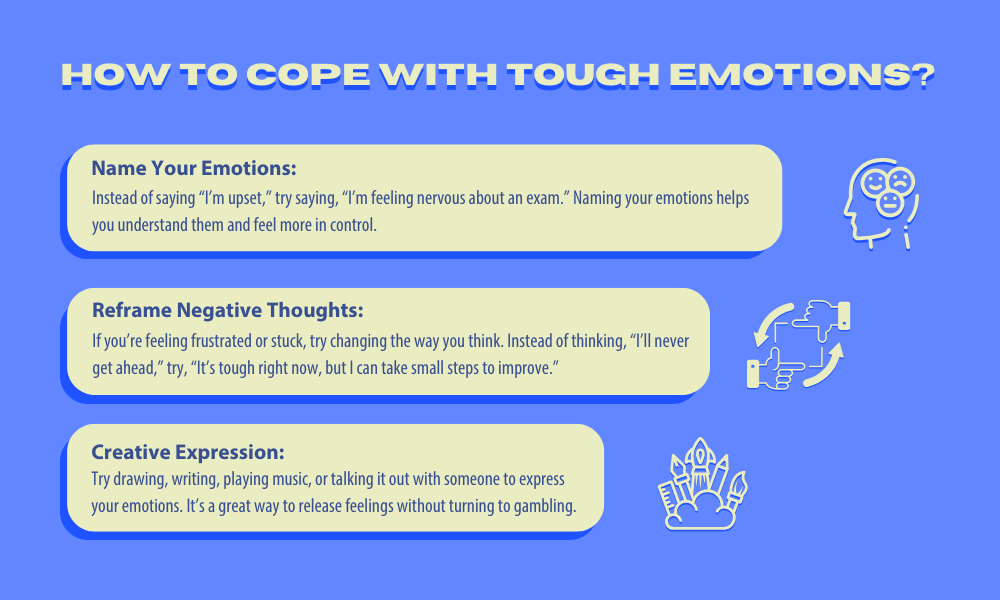
c) Building Resilience
Resilience is the ability to bounce back from challenges. Developing resilience will help them navigate life’s difficulties without turning to harmful coping mechanisms like gambling.
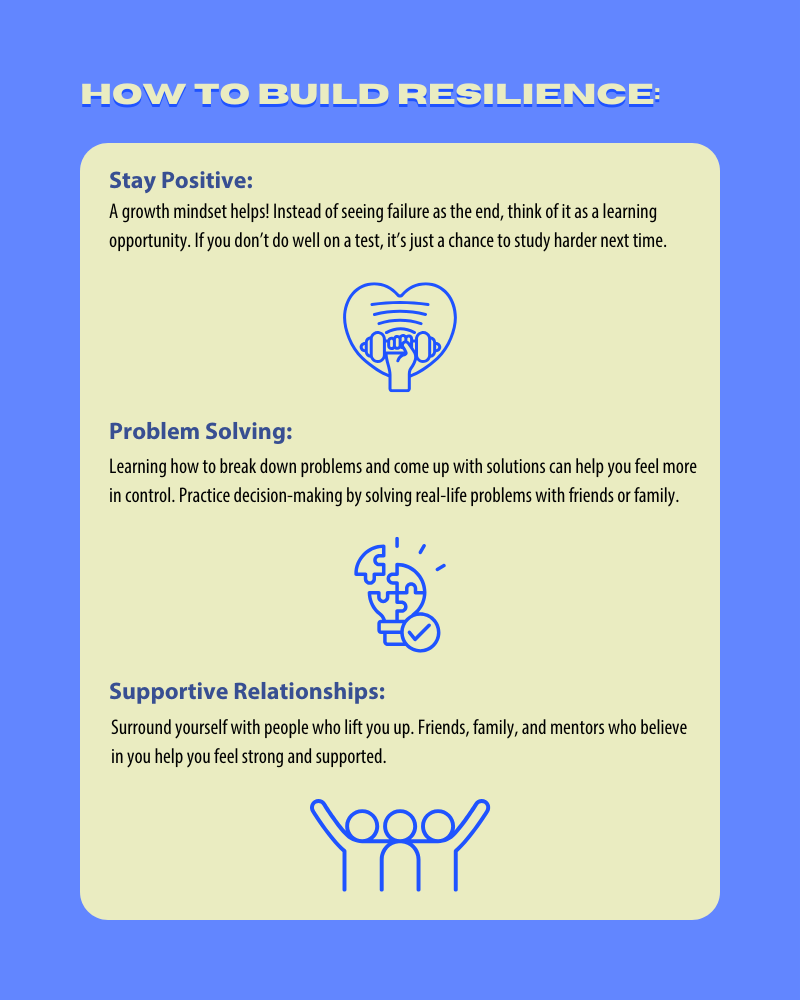
Resilience is the ability to bounce back from setbacks. Life isn’t always easy, but being resilient means you can face challenges without giving up or turning to harmful habits like gambling.
Ways to Build Resilience in Your Child:
- Foster a Growth Mindset: Help people to see challenges as opportunities for growth, rather than as insurmountable obstacles. When they encounter setbacks, encourage them to try again, learn from mistakes, and keep improving.
- Teach Problem-Solving Skills: Learning to break down problems into manageable steps. This helps them feel empowered and gives them practical tools to handle difficult situations, whether at school, with friends, or in family life.
- Build a Support System: Ensuring young people can rely on supportive relationships with you, family members, or mentors. Positive, caring connections are key to building resilience.
Example for You:
Organize problem-solving activities, such as puzzles or challenges, where you all work together to overcome difficulties. These can teach people that they are not alone in facing challenges, and they have the tools to persevere.
d) Managing Peer Pressure
Peer pressure is a major factor in why young people may gamble. When gambling is normalized or even glamorized in a social group, young people might feel pressured to participate.
How to Handle Peer Pressure:
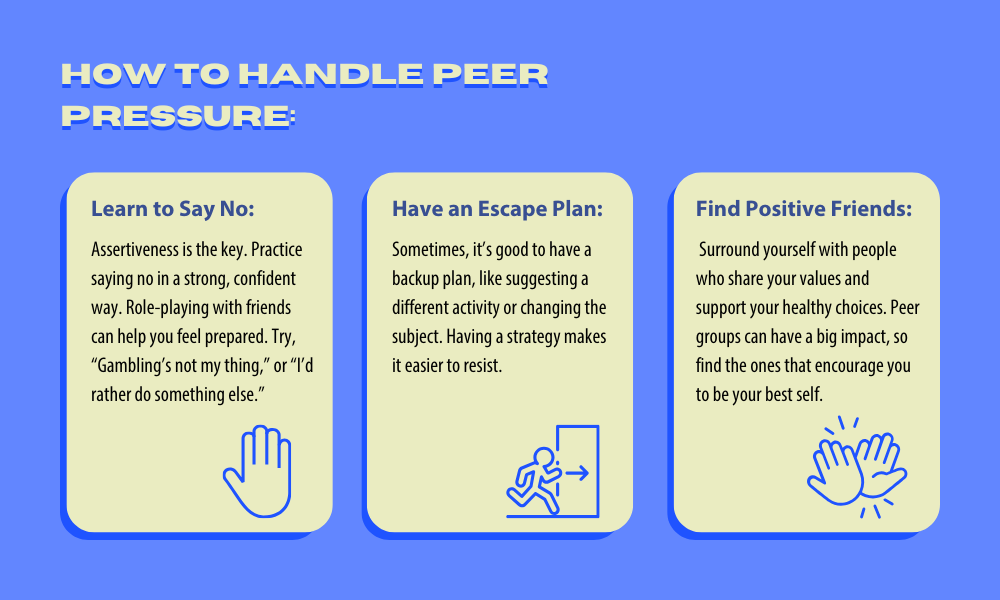
Helping to Resist Peer Pressure:
- Teach Assertiveness: Practice saying no in situations where they feel pressured. For example, role-play situations where they might need to refuse an invitation to gamble, using statements like, “I’m not into that,” or “I prefer to do something else.”
- Equip Them with Refusal Skills: Prepare them with strategies to avoid peer pressure, such as suggesting an alternative activity or simply changing the subject when gambling is brought up.
- Encourage Positive Friendships: Support in building relationships with peers who share their values. A strong, supportive group of friends can help them resist negative influences.
Example for You:
Consider hosting a ”Peer Leadership Workshop” where young people and their friends practice resisting peer pressure and develop leadership skills in a supportive environment.
e) Developing Interpersonal Skills
The ability to recognize and regulate emotions—both in themselves and in others—is crucial for maintaining healthy relationships and avoiding behaviors like gambling.
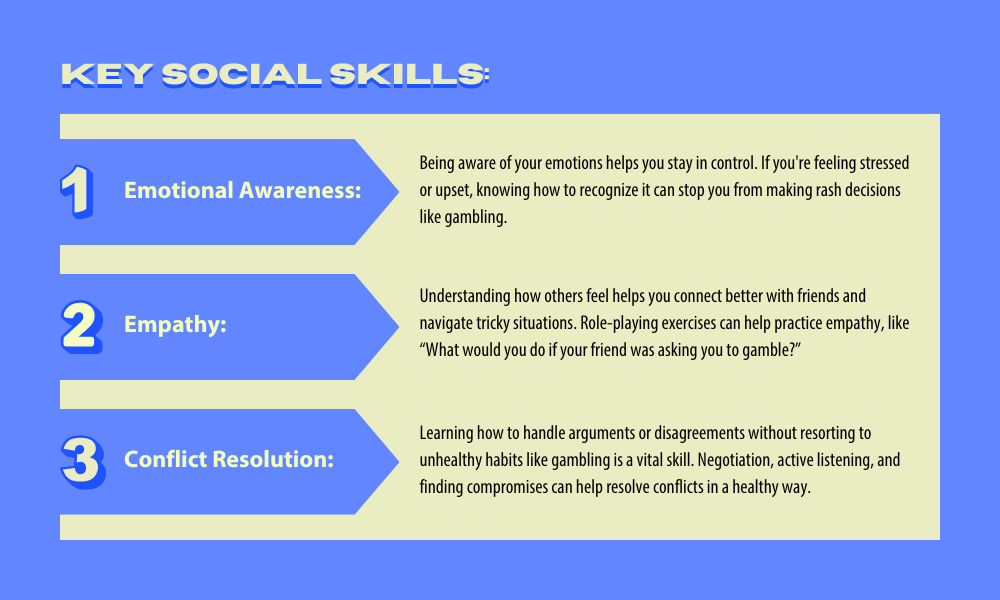
Key Interpersonal Skills:
- Emotional Awareness: Encourage youngsters to check in with themselves and notice how they’re feeling in social situations. This awareness can help prevent impulsive behaviors like gambling.
- Empathy and Social Awareness: Help them to understand others’ feelings and respond to emotional cues. This can promote prosocial behaviors and reduce the chances of negative influences, including gambling.
- Conflict Resolution: Teach how to manage conflicts constructively. Having the skills to negotiate and listen actively can help them deal with difficult social situations without resorting to harmful behaviors.
Example for You:
Practice conflict resolution skills together, such as role-playing how to resolve disagreements calmly. This will not only improve their ability to handle conflict but also help them build stronger, healthier relationships.
By working together to develop these key psychosocial skills—stress management, emotional regulation, resilience, peer pressure management, and interpersonal capacities—you can help young people avoid the harmful effects of gambling and build a strong foundation for making healthier choices. Your involvement and support are crucial in guiding them through these challenges.